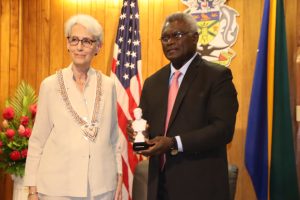Force and persuasion are the two primary ways states achieve power in the international system. Yet for states that don’t have conventional military might, great wealth, or a way to compete with dominant cultures, there is often the need to be more creative. Pacific Island countries have proved adept at using their limited resources to have their voices heard by other states, especially on the issue of climate change. Yet in Solomon Islands, this sophisticated approach to foreign affairs has given way to a more blunt tool, with Prime Minister Manasseh Sogavare instead resorting to the use of blatant manipulation to secure power.
China’s rise as an influential player in the Pacific has obviously spooked Australia. Not only is Australia concerned about its own traditional sphere of influence and its security imperatives, which seek to prevent unaligned powers from gaining military access to Pacific islands, there is also a concern about the degradation of democratic and liberal norms that can materialize through the influence of authoritarian regimes (not to discount the influence of authoritarian actors in democratic states as well). These fears in Canberra have been seen by Sogavare as a great opportunity.
Since Solomon Islands signed a broad-based security agreement with China in April, fears in Canberra have escalated significantly. The agreement didn’t just get Canberra’s attention, but also the United States’, attracting several high-profile diplomatic visits to the country. This attention has also come with the promise of greater resources directed to Solomon Islands. As a tactic to improve the country’s basic needs, it has so far been successful.
But the security agreement with China has also brought Solomon Islands something more than greater development assistance. It has given Sogavare himself, in Seinfeldian terms, “hand” in the relationship with Australia. Sogavare has gained the freedom to act without having to worry about what its largest donor may think, or whether his actions will threaten Australia’s assistance. Canberra’s objective is now to please him — or at least to remain quiet, for fear that it may push Sogavare closer to Beijing.
Sogavare has taken this newfound power and run with it. His first move was to shift the nature of the Solomon Islands Broadcasting Corporation (SIBC) from a public broadcaster to effectively a state broadcaster, transferring its budget to be under the direct control of the government, and stipulating to its journalists that it must now only broadcast stories that paint the country’s government in a positive manner. He has also threatened to ban foreign journalists from the country due to being unhappy with their coverage.
He followed this with another audacious move by submitting a bill to parliament that seeks to delay the country’s next parliamentary elections. The current parliamentary term is due to expire in May 2023, yet Sogavare wishes to remain prime minister until November next year because Solomon Islands is hosting the Pacific Games and he wants to take the international stage. Astonishingly Australia’s Pacific minister, Pat Conroy, stated that he was given assurances that this would just be a “once-off.” Yet with Canberra so meekly submitting itself to Sogavare’s machinations it is almost guaranteed not to be.
Then, to consolidate this shift in power dynamics between himself and Canberra, Sogavare once again hit Australia where it really hurts – announcing that Solomon Islands had secured a $66 million loan from China for the Chinese telecom firm Huawei to construct 161 new mobile communications towers in the country. Australia has banned Huawei from its own 5G network due to its close links to the Communist Party, and due to China’s national security laws, which require companies to cooperate with the intelligence services. Previously Australia had intervened to construct an undersea telecommunications cable from Sydney to Honiara and Port Moresby after an initial agreement with Huawei. However, it is unlikely that Canberra will step in again.
In playing China off against Australia and other allies Sogavare is engaged in a fairly rational game of maximizing the number of resources Solomon Islands can secure from both China and the West. As a country with significant development needs, this on paper looks positive, although what strings are attached to China’s assistance is unknown. Bringing resources into Solomon Islands also facilitates Sogavare’s personal goal of maintaining domestic power. It provides him with a list of achievements he can sell to the public when, eventually, the next election is held.
Sogavare is a canny political operative. He is currently in his fourth non-consecutive period of being prime minister. Each time he loses the job he has been able to find a way to regain it, managing to maintain a presence as a major political player for over two decades. It is clear that he is now using these skills to enhance his international power as well, although it is debatable whether overall this is as fruitful for Solomon Islands as it is for him personally.

































